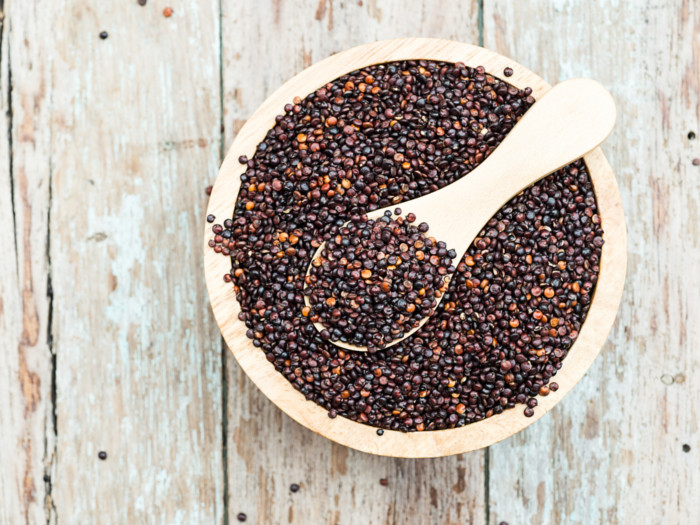Adding black quinoa to your diet is a simple and delicious way to boost nutrient intake and improve your overall health.
What is Black Quinoa?
Black quinoa is a type of quinoa that is a cross of white quinoa and lamb’s quarter, a type of grain. The resulting crossbreed quinoa seed has a darker color than white quinoa and a crunchier texture. It also has a slightly sweeter taste and is typically harder to find than the more popular red and white quinoa varieties. It is gluten-free and is a popular option for those who regularly shop at specialty health food stores. [1]
Benefits of Black Quinoa
Quinoa is a rich source of many nutrients such as protein, iron, B vitamins, anthocyanin, copper, manganese, and alpha-linolenic acid that help boost health in many ways. Let us look at the top benefits of black quinoa in detail.

Black quinoa is earthier and sweeter-tasting than white quinoa. Photo Credit: Shutterstock
High Fiber & Protein
Black quinoa is one of the few plant-based sources for complete proteins – proteins that contain all ten essential amino acids. It is one of the best vegetarian sources of protein available. This rather unique form of quinoa also has slightly more fiber content than other types of quinoa.
Source of Iron
Iron is what your body relies on to transport oxygen throughout your body. A lack of iron in your daily diet can lead to fatigue, weakness, and anemia. One cup of black quinoa contains 15% of the daily recommended serving of iron.
Supplies B Vitamins
This darker version of quinoa contains a good dose of folate, a B vitamin that is essential for healthy liver and nervous system function, as well as skin, hair, and eye health. It is also a good source of copper, manganese, and alpha-linolenic acid, which can reduce inflammation and help to protect cardiovascular health. [2]
Rich in Antioxidants
The dark color of black quinoa is caused by its high anthocyanin content. Anthocyanins are a type of antioxidant that helps prevent UV and free radical damage to cells. Antioxidants are able to protect against chronic illness and heart disease.
Gluten-Free
Black quinoa is a highly nutritious, low-fat alternative to white grains for people who are trying to avoid gluten in their diet. [3]
Side Effects
The side effects of black quinoa include:
- Digestion problems: Some people may report digestive distress from consuming quinoa, but this may be due to the increase in digestion-stimulating fiber.
- Foodborne illness: Always be sure to wash quinoa thoroughly before cooking, as there have been some links between this form of grain and cases of foodborne illness.
